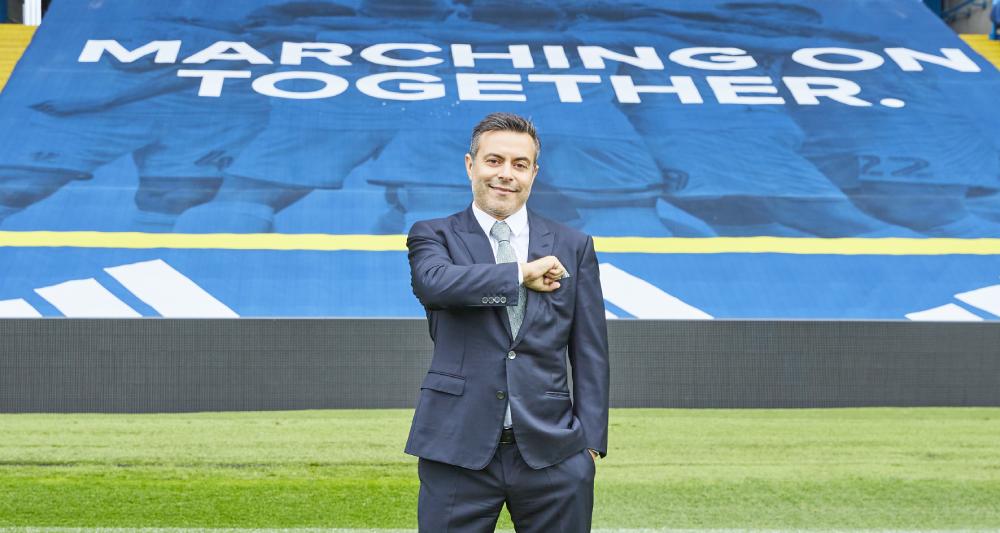 Part
1 The Monk and the Madman - Results, table
and transfers
Part
1 The Monk and the Madman - Results, table
and transfers
12 April 2016.
Astute young Italian entrepreneur Andrea Radrizzani arrives in Manchester
to meet some acquaintances for lunch before taking in that evening's Champions
League match between Manchester City and Paris Saint-Germain.
Radrizzani, born in Milan in September 1974, had made himself a rich
man by selling football broadcasting rights, in particular the Premier
League. In 2004, he and business partner Riccardo Silva founded MP & Silva
Limited as an international sports marketing and media rights firm.
Later that year, MP & Silva acquired the global rights distribution for
a number of the clubs in Italy's Serie A. They made a great success of
the deal and a couple of years later they acquired the rights for the
majority of the Serie A clubs.
They quickly built a portfolio of media rights across Europe and then
added distribution deals with Asian TV. In 2010, MP & Silva moved its
headquarters to London and began working with Arsenal.
Radrizzani arranged his trip to Manchester as a break from intensive
negotiations for the $1 billion sale of MP & Silva to Everbright Securities
and Beijing Baofeng Technology.
His experience of the football industry made Radrizzani only too aware
of the eyewatering sums available to the most successful clubs. In 2015,
the daddy of them all, Manchester United, had generated income of £183
million, £100 million of which came from television. It was rumoured that
the 2015/16 season would see each club competing in the Champions League
guaranteed a fixed fee of €12 million, with the overall winner banking
€33.5 million.
Radrizzani would soon have a small fortune available to bankroll an investment
and reasoned that a punt on the right club would be a good fit with his
existing portfolio and offer the potential for huge returns.
'I like to make money,' he said later, 'my reward is to make money and
be profitable. I take risks, I like to because at the end it's like a
game. One day I'm going back to the dust like everybody, so money doesn't
count. I like to invest in things that give me adrenaline, and business
is one of them, football is one of them, so I enjoy that.'
He had initially focused on clubs in Italy, France and Spain, planning
to make money from developing young talent for the transfer market.
Radrizzani's direction of travel was transformed by a chance conversation
that afternoon.
back to top
The Italian found himself sitting next to Liverpool legend Kenny Dalglish.
The pair had never met before but their mutual interest in football soon
had them in animated discussion which eventually moved on to Radrizzani's
plans. Radrizzani found Dalglish's strong Glaswegian accent impenetrable
but he pricked up his ears as he saw Dalglish's eyes light up as he mumbled
the words 'Leeds United'.
'It wasn't easy to understand, but I did. He mentioned the great opportunity
if someone had a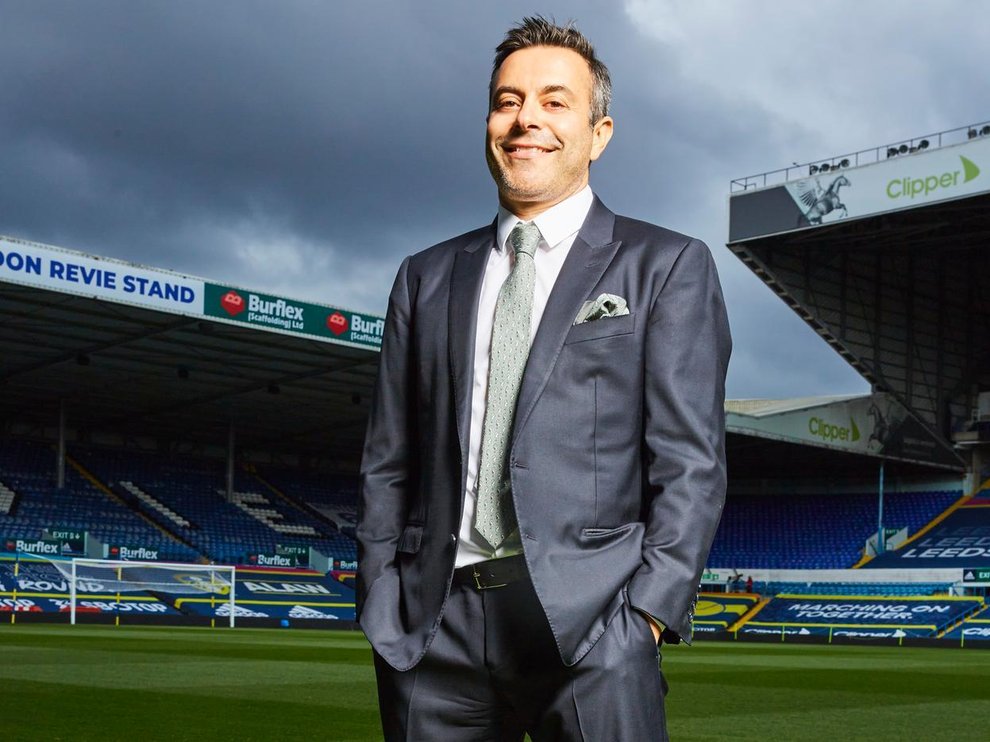 concrete project with a vision. He also mentioned how the city is passionate
about the club and this is what I'm finding out. Maybe he knew that I
couldn't buy Liverpool.
concrete project with a vision. He also mentioned how the city is passionate
about the club and this is what I'm finding out. Maybe he knew that I
couldn't buy Liverpool.
'It's not really that he spoke to me in a serious manner. We were talking
about many things and for two minutes we talked about Leeds - the sleeping
giant, the opportunity for someone coming here.
'We were casually speaking about the legacy of Leeds United and how good
it would be to bring back Leeds to the glory. It was the first time I
was hearing about the history of Leeds and the potential. I love challenges
in my life and I love to turn around organisations.'
It was then, Radrizzani says, that he 'put the two things together -
initially I wasn't even thinking about making an investment in football.'
The discussion lodged itself in the Italian's subconscious and nagged
away at him over the next few weeks as a plan formed.
'A few weeks later, at the end of May, I remember I was talking about
different clubs and someone mentioned Leeds. Then I got in touch with
Massimo Cellino, who at that time I didn't know. I got his contact from
my business partner and I called him. I pretended to be an agent investing
for another buyer, a potential investor in Asia. Cellino opened up completely,
saying that he was ready to sell. He was alone and his family were in
London and he was in Leeds all the time, he would welcome a potential
investor.
'After a few days, I said, "What if I were to invest?" and then he changed
completely. He said, "Let's do this together, join me." He had found someone
with energy. He showed me he believed in the squad he was building and
didn't want to leave Leeds in a bad way.'
It was agreed that Radrizzani would buy 50% of the club with the option
of securing the remainder if Leeds failed to win promotion.
It took Cellino from the beginning of September to the end of December
to clean up Leeds United's opaque share ownership and finally remove the
complication of GFH's involvement.
On 30 December, Cellino's Eleonora sold 50% of the shares to Radrizzani
for £20 million.
Cellino had just suffered another embarrassment at the hands of the League,
found guilty of various breaches of FA Regulations. Cellino was banned
from football for 18 months and fined £250,000 for his involvement in
Ross McCormack's transfer to Fulham in 2014. Leeds were also fined £250,000.
An unauthorised agent, Barry Hughes, had helped Leeds obtain the impressive
£10 million price in return for a fee of £250,000. At the time of the
transfer, Leeds had employed a former FA compliance officer, Graham Bean,
to ensure the correct paperwork was signed off in relation to transfers
and associated football business. Neither Cellino nor Bean, nor anyone
else at Leeds, was aware Hughes was not authorised.
When he later sent in an invoice for his commission there was an argument
about whether and how Leeds could pay him. An FA Commission found that
Bean suggested the payment be via a Consultancy Agreement with an authorised
agent, Derek Day. Cellino subsequently fell out with Bean, who was dismissed.
He turned whistleblower and informed the FA of the issue.
The following October the FA agreed without admitting liability to set
aside the decision of the original 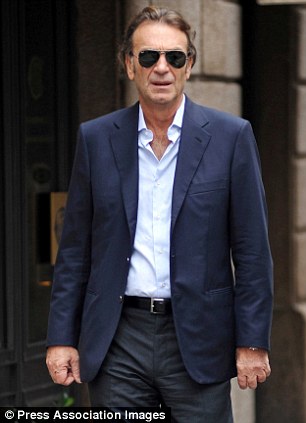 Appeal
Board and allow Cellino a new appeal before a fresh panel. They rejected
the main thrust of his appeal but reduced the sanction imposed upon him
to 12 months and the fine to £100,000. The club's fine was reduced to
£200,000.
Appeal
Board and allow Cellino a new appeal before a fresh panel. They rejected
the main thrust of his appeal but reduced the sanction imposed upon him
to 12 months and the fine to £100,000. The club's fine was reduced to
£200,000.
United fans had been speculating for months about a potential sale and
there was wishful thinking about possible interest from Alan Sugar, Steve
Parkin and an LA-based consortium headed by Vinnie Jones.
back to top
In May, Cellino told The Times that he was ready to give United
fans what they wanted and sell out. As the Football League considered
his reinstatement as chairman after two bans and an acquittal on tax-evasion
charges, Cellino admitted, 'I've had enough. It's better to walk out,
not because I'm dishonest but because I'm tired and hurt and lonely. Why
did they disqualify me when they knew the truth? I don't want to complain
because I'm a foreigner, but I'm lost. I have no happiness any more and
don't know if I have the enthusiasm for the next season. If I could turn
back time and you ask whether I would come to this club, I would say never.
But now what should I do? Cry?
'I'll tell you the truth - I've never been so confused. I'm nearly 60
and would never have expected that from Leeds. I'm ashamed to say it.
If someone wants to buy the club, I will sell it. If somebody doesn't
come in, I have no choice but to run it.'
Cellino revealed that he had spoken to groups interested in a takeover
but was dismissive. 'A lot of people have called me to buy the club but
they are just fishing and trying to take advantage of my situation. I
don't see the money.'
But Radrizzani certainly had the money after the sale of his firm and
was ready to move.
The popular rumour was that 'a Chinese consortium' was set to invest
and when Radrizzani was pictured, sat alongside Cellino at the opening
game of the 2016/17 season at Loftus Road, the attention was all on the
oriental suits to his left.
Even when Radrizzani was identified, many thought that he was just fronting
the deal for the Chinese, though BBC sports editor Dan Roan revealed the
truth on 11 August. When Radrizzani started following Leeds United and
Garry Monk on Twitter, Leeds fans started wildly speculating, though opinions
fluctuated wildly from 'another dodgy Italian' and 'just another chancer
trying his luck' to 'a serious billionaire businessman'. On the waccoe.com
fans' website, Ming52 queried, 'Surely this time there can't be any buyers
left out there more skint and incompetent than what we've got at the moment?'
Cellino had made it obvious that he was not happy with the way things
were going, splitting his time between Leeds and Miami. It was a key factor
impacting on his decision to walk away if the results did not come. The
realisation that this could be his last year in charge was one of the
factors in the delay over appointing a new head coach, Cellino mercilessly
spinning out Steve Evans' time at the helm.
Cellino and Radrizzani had sat together at a number of Leeds games and
it was Radrizzani who held back Cellino's trigger finger when he was of
a mind to fire Garry Monk in the early weeks of the season.
Rumours that a deal was in the offing gathered pace when the two men
were seen together in the directors' box at Elland Road on 20 November
when Leeds lost to Newcastle.
At the end of November, Radrizzani spoke to The Straits Times,
an English language daily broadsheet newspaper based in Singapore and
confirmed his interest and that he was in 'advanced negotiations' with
Cellino.
'Massimo has 100% now and if I do the deal, I will enter the club during
this season with 50% and have the option to buy him out completely in
June. Leeds are exciting. They are a sleeping giant as everyone knows.
Probably the only big brand left in English football that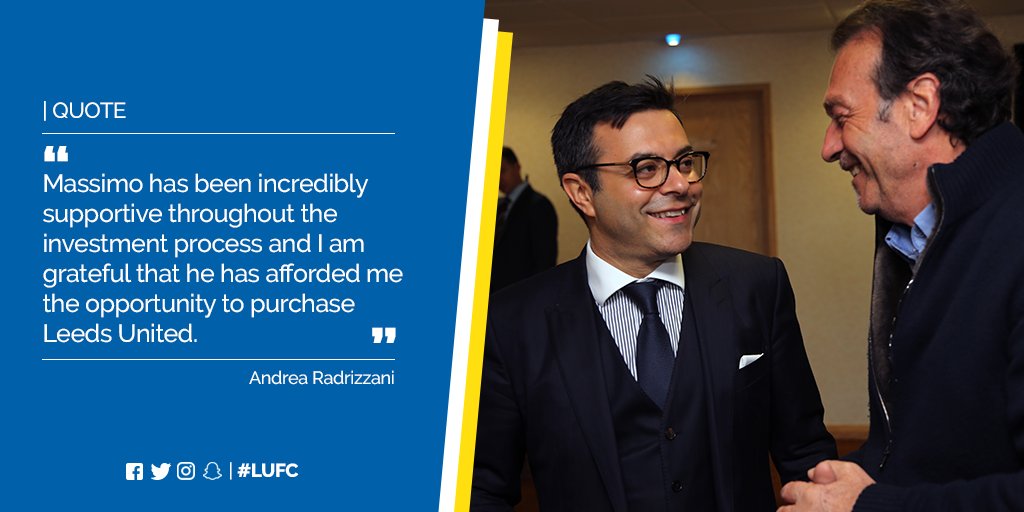 could grow in terms of value.'
could grow in terms of value.'
On the morning of 14 January, the day after a passionate evening at Elland
Road when Leeds played Derby off the park, the couple gave a press conference
on the fourth floor of Elland Road's main stand.
Radrizzani had acquired 50% of the club a fortnight earlier. As Cellino
fidgeted and joked, making a light-hearted Pinocchio gesture when Ben
Mansford said, 'Garry's happy' about his position at the club, Radrizzani
gave measured answers, careful not to inflate expectations.
Saying that he felt 'that the only way we can get better is for me to
bring in a new partner', Cellino continued, 'Andrea is young and brings
a new energy with him, as well as having a good experience in the football
media business … Bringing Andrea in as a 50% shareholder to work with
me is the best choice we could have made. We will continue building a
strong and healthy football club.'
back to top
In the far corner of the room a poster of Peter Lorimer promised, 'Real
History. Real Future. Real Choice.' And it felt like there had been an
outbreak of common sense at Elland Road.
None of the previous six managers appointed by Cellino had lasted a year,
but Radrizzani said that his intention was for Monk's one-year contract
to be upgraded into a three-year deal. 'We will sit down at a certain
point and discuss the details but the intention is on both sides to continue.'
As for transfers, Cellino said he had specifically asked Radrizzani not
to throw money at the squad in the January window. Plans were largely
as they were before Radrizzani's arrival.
'Our CEO is leading the negotiations,' said Radrizzani, 'and trying to
satisfy Garry's requests - which, to be honest, are not so difficult.
But the market is very active and challenging because the players we identified
are good boys and good players. We're not the only ones wanting them.
Let's see if we can bring in option one or two.'
There was a determination not to sell Charlie Taylor and to turn Pontus
Jansson's loan deal into a permanent £3.5 million transfer from Torino.
Cellino said he had sought investment from Radrizzani 'because the numbers
in the Championship are a little bit scary … It takes a lot of money to
fix this club'.
If Monk was 'not fixated' on immediate promotion, as he remarked a week
earlier, then he and Radrizzani were at one. 'We need to plan investment
year by year,' said the Italian. 'If we go to the Premier League, this
investment can be accelerated. Then we have a better budget to work with.'
He could have chanced everything on a hell for leather pursuit of immediate
promotion but spoke instead of 'gradual innovation' whatever division
the club was in. 'If you want to compete and win just by buying players,
it could be a disaster for the club, because if you don't go up in two
years, you basically need to get out and change ownership again. The Championship
is a great league, but very difficult. We will see a lot of this in-and-out
of ownership because it is difficult to sustain a loss for many years.
Anybody would think this, even if they have a passion for football. At
a certain point you get tired of losing money.'
Radrizzani gave himself five years to make an impact. 'My commitment
to the club is long-term and I will endeavour to be a fitting custodian,'
he had written in the matchday programme. 'There is a lot to do here but
luckily in my life I had the opportunity to work closely with many big
clubs 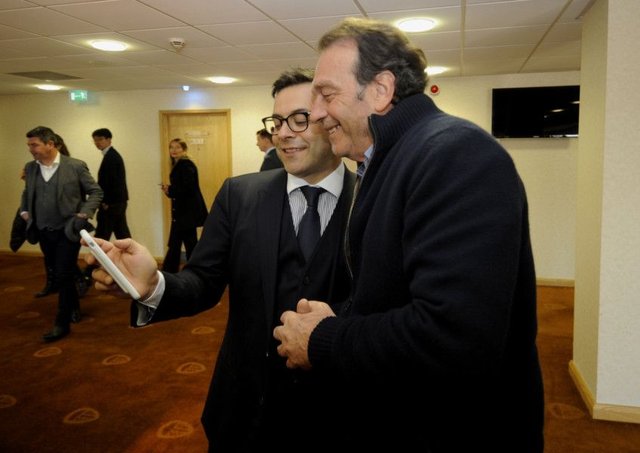 in
the UK and other countries,' Radrizzani said. 'I know exactly how clubs
are structured, how they work and how they increase their revenue internationally.
Obviously, we're playing in the Championship and we can't do everything,
but we can start to make the club a little bit more ready. What I found
here is that a lot of things are still very old. Not only the facilities
but also in terms of services and operations. Gradually we need to bring
in a little bit more innovation but we have good people. We start from
there.
in
the UK and other countries,' Radrizzani said. 'I know exactly how clubs
are structured, how they work and how they increase their revenue internationally.
Obviously, we're playing in the Championship and we can't do everything,
but we can start to make the club a little bit more ready. What I found
here is that a lot of things are still very old. Not only the facilities
but also in terms of services and operations. Gradually we need to bring
in a little bit more innovation but we have good people. We start from
there.
'The club cannot make big investment while we're in the Championship,
but we can start to increase and improve a little bit the services in
certain areas - the media, potentially a website with live streaming of
games allowed by the new agreement with the League next season. Other
improvements should come soon.
'My first priority will be to study carefully the situation with the
Elland Road contract, the option to buy it back, to look at what it brings
in terms of financial cost for the club and to study the alternatives.
This for sure will be one of my priorities. It's very important for the
club.
'I'm not here to make big losses or to lose money for many years but
I can promise that I'm happy to invest to reactivate the engine, let's
say. That's a good expression. To make the club progress year-by-year
and gradually, even in the Championship. I'm happy to make investment
and to take some losses for a few years but of course I have a timeline
that in my mind is five years to see good results from this club. Hopefully
before.'
Cellino was appealing against his 18-month ban, which was due to start
two weeks later. If his appeal failed, he would be required to step down
from United's board and sever all ties with the club until August 2018.
Radrizzani said that decisions in that scenario would 'be taken by us
and the management'.
He intended to delegate duties as a matter of course to Monk and Mansford,
a policy which had been successful all season.
With an approach at stark odds to Cellino's declaration when he arrived
that 'I drive the bus', Radrizzani promised, 'We can easily manage Leeds
together if we give responsibility and delegate to the management.'
Cellino had kept Radrizzani in the loop about all plans and proposed
changes since May, when their talks began, including Monk's appointment.
It had helped Radrizzani to hit the ground running.
back to top
The welcome from the fans for Radrizzani was warm, with relief at the
potential departure of Cellino. They had been dismayed at rumours that
a multi-national corporate giant like Red Bull were circling but were
equally unhappy with egotistical autocrats like Bates and Cellino. They
recognised that the days of Leslie Silver-type owners were over but Radrizzani
seemed to have the happy knack of combining wealth, sanity and humility.
He might have shared Cellino's nationality, but the two had little else
in common; Radrizzani's urbane composure contrasted sharply with the reactionary
approach of his predecessor.
Radrizzani paid £44.8 million to buy United from Cellino, with the latter
banking a profit of £3.5 million.
Radrizzani secured unencumbered control when United's end-of-season slump
put an end to promotion hopes. 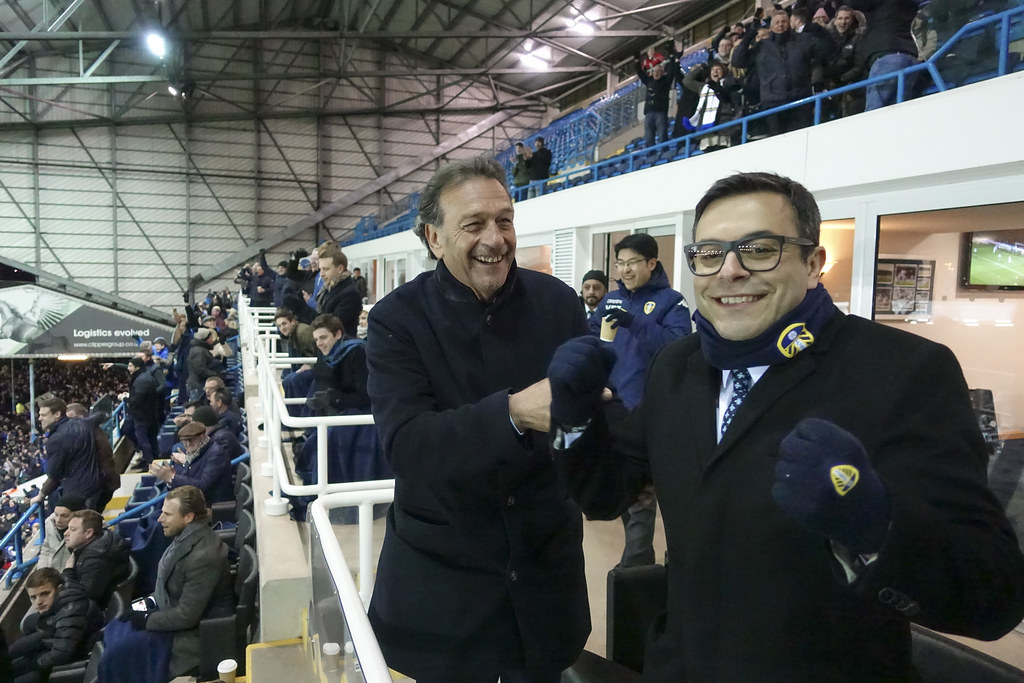 By
August, Radrizzani claimed, £100 million had been sunk into the project.
By
August, Radrizzani claimed, £100 million had been sunk into the project.
Radrizzani laid out his ambition: 'I am giving a maximum of five years
to be in the Premier League. If I try and I am not able then it is probably
best for someone else to try, maybe with more resources than me. If I
go up, I'm not selling. I am young, I can stay here for twenty years and
enjoy … Why build all of this if I then have to leave? If, however, in
five years I don't succeed … obviously there is a cycle for everything.
It could be the end of the cycle if I realise I am not good for this job.
'What we could see in the next few years is a huge change in the consumption
of media … Try to imagine if every Premier League match was now available
via Amazon or Netflix. The audience could be much bigger, the single price
per client could be lower, the total amount would still be bigger.
'The consumer is tired of paying for a bundle. To pay £70 for 200 channels
when maybe they just want to watch sports or football and maybe some movies
or TV series. That has been shown clearly on the entertainment side because
Netflix has broken the market on pay-TV with entertainment. Can this happen
with sport? I think so.'
Radrizzani was clear that 'Championship clubs lose money, Premier League
clubs make money … It is not sustainable to stay in the Championship …
It's difficult to be in a league where we make losses, because there is
not enough income generated from media rights.' Losses were very much
the norm for clubs in this most competitive of divisions.
Asked about the supporters, Radrizzani said, 'They were just waiting
for someone to build a bridge of communication with the club that was
missing and they were pleased with that … Most of them understand that
we are at the beginning of a project. Obviously, they dream big but at
the end of the day we have to be realistic about what we can do and if
we cannot make it this year, we work harder to make it next year.'
back to top
Radrizzani hoped to re-establish bonds with the local community, saying,
'We have been engaging with the community, the city council, the fans,
the foundation. Everyone is now together … The supporters have been very
positive generally and I just wish and hope this positivity remains in
the time when some weekends we are sad, because we need their support.
And for sure football is up and down.'
Radrizzani failed to agree a contract extension with Monk, who chose
to walk away with Leeds set to activate the option to extend his contract,
saying he could not 'agree a suitable way for us all to move forward together'.
One reason for Monk's reticence was being forced to work with a Director
of Football, the Spaniard Victor Orta.
Orta was recruited from Championship rivals Middlesbrough and given responsibility
for identifying and recruiting players.
The loss of control over what he saw as a vital part of his role irritated
Monk, who had wanted a new,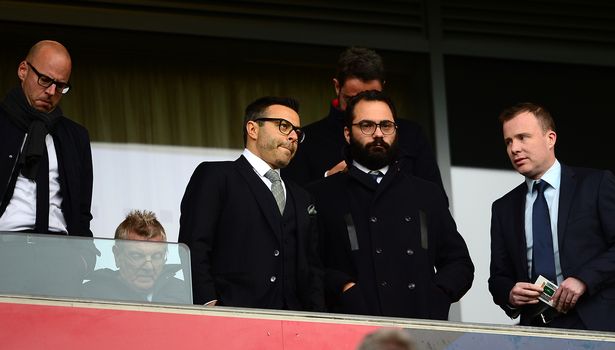 longer-term deal and a salary increase. He withdrew from discussions,
emerging a fortnight later as the new manager at Middlesbrough, with Leeds
claiming that Monk's head had been turned before any contract negotiations
took place. A bigger budget and a side supposedly better equipped for
promotion was enough for Monk to swap Elland Road for the Riverside but
the grass was no greener. After 23 matches, Boro owner Steve Gibson sacked
Monk.
longer-term deal and a salary increase. He withdrew from discussions,
emerging a fortnight later as the new manager at Middlesbrough, with Leeds
claiming that Monk's head had been turned before any contract negotiations
took place. A bigger budget and a side supposedly better equipped for
promotion was enough for Monk to swap Elland Road for the Riverside but
the grass was no greener. After 23 matches, Boro owner Steve Gibson sacked
Monk.
By the end of August, Chris Wood and Charlie Taylor had followed Monk
out of Elland Road, with big money moves to Burnley. Kyle Bartley, Rob
Green, Liam Bridcutt, Souleymane Doukara, Alfonso Pedraza and Mo Barrow
also departed and the heart had gone from Monk's promotion-chasing squad.
In a former life, Orta was a sports journalist with Marca and Sky Espana,
also working as a football agent, and was a qualified coach. He got a
job on the Valladolid coaching staff and then joined Sevilla as part of
the technical and recruitment staff in 2006, the year they won the UEFA
Cup. Orta was promoted to the role of technical director and excelled
in recruiting young talent from smaller clubs abroad.
After much success at Sevilla, Orta was wanted by both Juventus and Fiorentina
and turned down a big-money offer to oversee central recruitment for the
Qatar league. Instead, he opted to join Zenit St Petersburg where he helped
to recruit Brazil's World Cup star Hulk. Orta then joined Elche in Spain
before being recruited to Middlesbrough in December 2015 as head of recruitment
through Boro's network of contacts in Spain. Orta was boss Aitor Karanka's
choice.
Orta helped Middlesbrough to promotion to the Premier League in May 2016
but the club were relegated the following year. Boro brought in a whole
host of players under Orta's guidance, including Victor Valdes, Brad Guzan,
Antonio Barragan, Bernardo Espinosa, Gaston Ramirez, Adama Traore, Viktor
Fischer, Fabio, Marten De Roon, Alvaro Negredo, Rudy Gestede and Patrick
Bamford.
Orta left his role at Middlesbrough on 24 May, two months after the exit
of Karanka, and joined Radrizzani's staff within the week, prompting many
to think that Karanka would be the new manager at Leeds.
Radrizzani also brought in former West Ham managing director Angus Kinnear
as chief executive officer. He had joined the Hammers in 2013, with his
principal area of responsibility being the move to the London Stadium.
He spent the previous decade at Arsenal as their director of marketing,
sales and partnerships, overseeing some elements of the move from Highbury
to the Emirates.
Kinnear had worked within the broader sport sector including being on
the board of Commonwealth Games England for five years. He had also worked
at a senior level at Coca-Cola and Proctor and Gamble.
43-year-old Kinnear took up his role on 8 June, replacing outgoing chief
executive Ben Mansford.
'I genuinely believe it's the best job in football,' enthused Kinnear.
'If we can take Leeds United back to where they belong, I don't 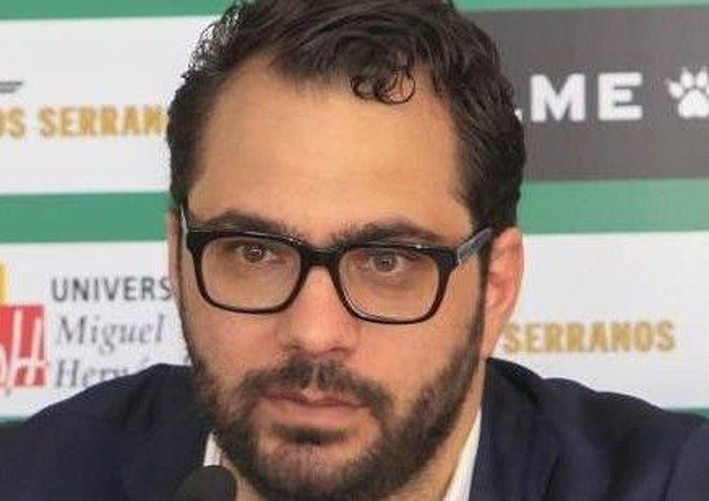 think
there's a bigger challenge, I don't think there's a bigger prize. It's
a club with such fantastic history, such a fantastic potential, so I didn't
think twice about it. With Victor and Andrea we overindex on Latin American
and Hispanic passion, I'm definitely the boring Anglo Saxon who tries
to steer through the middle path. It's a fantastic working environment,
we're friends as well as colleagues. We all want to achieve success together.'
think
there's a bigger challenge, I don't think there's a bigger prize. It's
a club with such fantastic history, such a fantastic potential, so I didn't
think twice about it. With Victor and Andrea we overindex on Latin American
and Hispanic passion, I'm definitely the boring Anglo Saxon who tries
to steer through the middle path. It's a fantastic working environment,
we're friends as well as colleagues. We all want to achieve success together.'
Radrizzani set the wheels in motion for the purchase of the remaining
50% owned by Cellino as soon as it was clear that there would be no promotion.
He completed the formalities on 23 May and assumed the role of chairman
with Cellino resigning from the board the following day. Thirty-six days
later came the announcement that Radrizzani had bought the stadium.
On 13 June, the back pages were dominated by the news that the grand
old stadium was back under United's control, thirteen years after Adulant
Force sold it off.
United reported that the deal would allow them to 'significantly reduce
their expenditure'. Kinnear, who would not confirm the financial details,
told BBC Radio Leeds that 'Andrea has only had full ownership for a few
weeks and he has delivered on his promise. The transaction has not been
easy but we are all delighted … There is a fantastic opportunity for development
and you can't do that if you don't own the ground.'
The deal saved a cool £1.7 million a year in rent and Radrizzani promised
that the savings would be invested in the first-team, the Academy and
improvements to the stadium. Modernisation took place over the summer
months.
Radrizzani took the hugely symbolic step of allowing Leeds United Supporters'
Trust to register the stadium as an Asset of Community Value, formalising
its main purpose as 'furthering the social wellbeing or social interests
of the local community'. This meant that locals could enact the Community
Right to Bid, giving them a moratorium period of six months to determine
if they could raise the finance to purchase the asset if it was listed
for sale within the five-year listing period.
Radrizzani's arrival coincided with a financial upturn; 2016's loss of
£8.9 million gave way to a £1 million profit, the first surplus since
2011.
Payroll costs rose to 77% of turnover, the highest ratio since 2015.
It still left United paying far less pro rata than the norm in the division.
Thirteen clubs paid out wages greater than their total income in 2016/17,
a disturbing echo of 'living the dream' under Ridsdale. In the case of
Birmingham City and Harry Redknapp, the figure was an astounding 202%.
Some people never learn.
United were one of only five Championship clubs to make a profit in 2017,
testament to the pressure to push the boat out in pursuit of the astronomical
rewards of the Premiership.
Cellino had managed to trim the sums owing to GFH via protracted negotiations
but Radrizzani employed different tactics, repaying half of the £17 million
which GFH claimed and demanding a legal review of the balance.
As Radrizzani progressed his plans, everything in the garden seemed all
set to flower.
Part 1 The Monk and the Madman - Results,
table and transfers
back to top












 Part
1 The Monk and the Madman - Results, table
and transfers
Part
1 The Monk and the Madman - Results, table
and transfers
 concrete project with a vision. He also mentioned how the city is passionate
about the club and this is what I'm finding out. Maybe he knew that I
couldn't buy Liverpool.
concrete project with a vision. He also mentioned how the city is passionate
about the club and this is what I'm finding out. Maybe he knew that I
couldn't buy Liverpool. Appeal
Board and allow Cellino a new appeal before a fresh panel. They rejected
the main thrust of his appeal but reduced the sanction imposed upon him
to 12 months and the fine to £100,000. The club's fine was reduced to
£200,000.
Appeal
Board and allow Cellino a new appeal before a fresh panel. They rejected
the main thrust of his appeal but reduced the sanction imposed upon him
to 12 months and the fine to £100,000. The club's fine was reduced to
£200,000. could grow in terms of value.'
could grow in terms of value.' in
the UK and other countries,' Radrizzani said. 'I know exactly how clubs
are structured, how they work and how they increase their revenue internationally.
Obviously, we're playing in the Championship and we can't do everything,
but we can start to make the club a little bit more ready. What I found
here is that a lot of things are still very old. Not only the facilities
but also in terms of services and operations. Gradually we need to bring
in a little bit more innovation but we have good people. We start from
there.
in
the UK and other countries,' Radrizzani said. 'I know exactly how clubs
are structured, how they work and how they increase their revenue internationally.
Obviously, we're playing in the Championship and we can't do everything,
but we can start to make the club a little bit more ready. What I found
here is that a lot of things are still very old. Not only the facilities
but also in terms of services and operations. Gradually we need to bring
in a little bit more innovation but we have good people. We start from
there. By
August, Radrizzani claimed, £100 million had been sunk into the project.
By
August, Radrizzani claimed, £100 million had been sunk into the project. longer-term deal and a salary increase. He withdrew from discussions,
emerging a fortnight later as the new manager at Middlesbrough, with Leeds
claiming that Monk's head had been turned before any contract negotiations
took place. A bigger budget and a side supposedly better equipped for
promotion was enough for Monk to swap Elland Road for the Riverside but
the grass was no greener. After 23 matches, Boro owner Steve Gibson sacked
Monk.
longer-term deal and a salary increase. He withdrew from discussions,
emerging a fortnight later as the new manager at Middlesbrough, with Leeds
claiming that Monk's head had been turned before any contract negotiations
took place. A bigger budget and a side supposedly better equipped for
promotion was enough for Monk to swap Elland Road for the Riverside but
the grass was no greener. After 23 matches, Boro owner Steve Gibson sacked
Monk. think
there's a bigger challenge, I don't think there's a bigger prize. It's
a club with such fantastic history, such a fantastic potential, so I didn't
think twice about it. With Victor and Andrea we overindex on Latin American
and Hispanic passion, I'm definitely the boring Anglo Saxon who tries
to steer through the middle path. It's a fantastic working environment,
we're friends as well as colleagues. We all want to achieve success together.'
think
there's a bigger challenge, I don't think there's a bigger prize. It's
a club with such fantastic history, such a fantastic potential, so I didn't
think twice about it. With Victor and Andrea we overindex on Latin American
and Hispanic passion, I'm definitely the boring Anglo Saxon who tries
to steer through the middle path. It's a fantastic working environment,
we're friends as well as colleagues. We all want to achieve success together.'